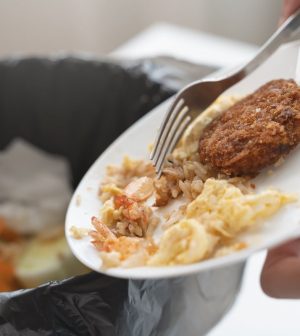- Could Your Grocery Store Meat Be Causing Recurring UTIs?
- Are You Making This Expensive Thermostat Error This Winter?
- Recognizing the Signs of Hypothyroidism
- 10 Strategies to Overcome Insomnia
- Could Artificial Sweeteners Be Aging the Brain Faster?
- Techniques for Soothing Your Nervous System
- Does the Water in Your House Smell Funny? Here’s Why
- Can a Daily Dose of Apple Cider Vinegar Actually Aid Weight Loss?
- 6 Health Beverages That Can Actually Spike Your Blood Sugar
- Treatment Options for Social Anxiety Disorder
Meds Like Ozempic Are Causing Folks to Waste More Food

America’s kitchen trash bins are receiving more unwanted food as appetites falter among people taking GLP-1 weight-loss meds, a new study shows.
GLP-1s like Ozempic, Wegovy, Mounjaro and Zepbound all work by making food less desirable, and it’s showing up in more food wasted at dinner tables, said a team led by Brian Roe, of Ohio State University.
The study surveyed 505 new GLP-1 users. It found 25% agreeing that they had wasted more food since taking the drugs, compared to 61% who disagreed.
There was some good news, however: Food wastage appears to decline as people adjust to their GLP-1 medication.
“The fact that food waste appears to decrease as patients acclimate to the medication suggests there may be a fairly simple remedy — advising patients new to these medications about the possibility of discarding food as their diets change, which could reduce food waste and lower their spending,” said Roe, a professor in the department of agricultural, environmental and development economics.
According to the researchers, 6% of all U.S. adults were taking a GLP-1 medications as of spring of 2024. The medicines act on a hormone in the small intestine to help lower blood sugar, slow stomach emptying and signal fullness in the brain.
In this study, almost 70% of respondents were taking semaglutide (Ozempic, Rybelsus, Wegovy) and nearly a quarter were taking tirzepatide (Mounjaro, Zepbound).
Many were relatively new to the drugs: Only a quarter had been using them for more than a year.
Everyone was asked to agree or disagree with the statement, “Since beginning this medication, I have found I waste more of the food that I purchase.”
About a quarter agreed that they were wasting more food, and that rate rose to 30% among people who’d only been taking the medication for 90 days or less.
Nausea was a leading cause of folks tossing out food, the study found. However, it also appeared that certain food types were looked on less favorably once people commenced GLP-1 therapy.
According to the research, people tended to shy away from alcohol, pasta and other carbohydrates, fried foods, sweets and dairy once they began taking a GLP-1, added more produce, protein, fish and healthy fats to their diets instead.
Once vegetable consumption began to rise, food wastage started to fall, the study found. According to the researchers, veggies have long been the most commonly wasted food group in the United States.
People who’d been taking a GLP-1 for at least one year lost an average 20% of their starting body weight, the study found.
The new study was published recently in the journal Nutrients.
Will changing food habits also shrink grocery bills for people taking Ozempic and its kin?
Maybe, said Roe, and a study looking at the household finances of GLP-1 users is planned.
“People taking these medications in all likelihood will be spending less on food, but whether there is a chance to offset the cost of the drug through reduction in food spending remains to be seen,” he said in a university news release.
More information
Find out more about GLP-1 medications at the Cleveland Clinic.
SOURCE: The Ohio State University, news release, Nov. 21, 2024
Source: HealthDay
Copyright © 2026 HealthDay. All rights reserved.










